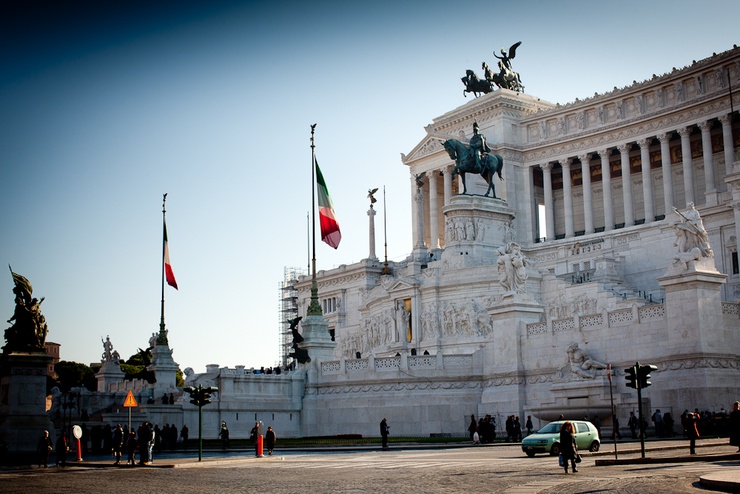
Multiculturalism in Italy: emigration and exodus
Published on
Not only are Italy's privileged leaving their country as fast as immigrants are arriving in Italy, but when they do move abroad their perception of their own national identity naturally changes. A new open-minded multi-cultural sensibility contrasts with the mindset of their parent's generation, but will they stay attached to their homeland?
As I wait for a bus in central Rome for almost an hour, I share my frustration with a young Roman commuter. She seems shocked that I speak her language. ‘Why on earth does a person choose to study Italian?’ she exclaims, implying that I must be mad to come to a country facing possible bankruptcy. I shrug. ‘Italy has always interested me.’ Ma che Italia é questa! (‘What kind of Italy is this!’) she sighs, as she looks wearily at her watch.
Italian crisis refugees
There is a palpable sense of disillusionment in Italy. Silvio Berlusconi advised that people should ‘find a rich husband’ or ‘look for a job abroad - it’s not so difficult’, when asked by young members of his freedom people party for employment advice. A year on he himself is out of a job, having ‘resigned’ as prime minister of a country he recently described as ‘shitty’. Berlusconi leaves behind a generation of Italians at the epicentre of a European financial volcano. As the unemployment rate climbs towards 30%, thousands of middle-class young Italians appear to be following at least part of his advice. According to the official brain drain website, around 100, 000 Italians are leaving the country every year, going as far afield as China and Australia with 60% in their 20s and 30s.

‘I’m so old!’ moans Sara, a graduate in business communication and just one of many refugees from the current Italian crisis. At 26 she’s certainly too old and too experienced to be working for a meagre 400 euros a week. Berlusconi changed the labour laws several times whilst he was in office, at first allowing firms to renew internships, meaning that many companies had little incentive to employ young people - why pay salaries when they could have eager young men and women, desperate to prove themselves for a few hundred euros or less? A new law means that internships cannot last more than six months; only graduates (no more than 12 months after graduation) can do internships. Originally from Turin, Sara cannot afford to live in Rome for much longer. Going abroad is her only option.
Going where ‘little Italy’ economies and mindsets aren’t
Elena, 21, from a town just outside Rome, plans to move to China when she graduates with a joint degree in English and Chinese in 2012. In Italy, she explains, the Chinese are often subject to racist stereotyping. Indeed, the very word ‘Chinese’ - Cinesi - is commonly used as a synonym for discount shops, which are often run by Chinese people, as well as for ‘job stealers’. Elena feels strongly many Italians are behind the times. ‘China’s economy is evolving. We must embrace the opportunities that come with it in a positive way,’ she says. Finance graduate Luisa, 22, is moving from Rome after landing an internship in Germany. It is not so much the flagging Italian economy that is driving her away, she says, as the ‘little Italy’ mentality that she observes around her. ‘I want to immerse myself in a new culture and be in an international environment, which Italy isn’t. Italians are not used to interacting with foreigners. Going abroad makes them more open-minded.’
30-year-old Elena Uderzo from Milan, who has worked for charities around the world in countries as diverse as Russia and Malawi is a living example. She still considers herself as a ‘spokesperson for Italian culture’ and is proud of her nationality, but admits that she has 'developed a mulitcultural sensibility after living in foreign countries.’ This internationalist outlook marks a dramatic generational shift. Loretta is a 25-year-old economics student from Barrea in Abruzzo, a town of 800 inhabitants. ‘My parents never went to university and have never been abroad,’ she says. ‘They chose their profession and stuck with it to support their families - whereas our generation have more personal ambitions and are more curious about the outside world.’ In reality it is not as simple as the old Italian proverb Chi esce riesce (‘who leaves succeeds’). Adapting to life in a new country can be a lengthy process, even in Europe. When Natalia, now based in Kenya, left Bologna to go to London in 2007, the language barrier meant she had to start again from the bottom: ‘I went back to being a waitress again, like when I was at university,’ says the 33-year-old graduate in modern languages. ‘Three years later and she still felt like a ‘guest’.
Will they come home
Just like immigrants coming to Italy, Italians abroad can encounter prejudice. ‘Italians are intrallazzatori (‘wheeler-dealers’), the French don’t use a bidet and the English are just dirty!’ laughs Luisa. Loretta describes how a friend of hers was asked seriously if he was Berlusconi’s grandson at a job interview in England - presumably he was the only modern Italian they’d ever heard of. Davide, 24, a Roman graduate in international relations with ambitions to work in Australia, is less sure. ‘I feel at home wherever I go in Europe. Italy is a part of Europe, now more than ever.’ It was his year as an erasmus student in Paris that changed his vision not only of Europe but of the whole world. ‘Unless things change, there is no way I’m going back to Italy.’ Even now that Super-Monti is in charge? ‘He’s just another banker, isn’t he?’

This generation are not the first to turn their back on their country. During the depression in the 1930s, thousands of impoverished Italians went in search of the American dream; later, as fascism gripped the country, many jews and left-wingers fled in fear. It remains a peculiarly Italian irony - to any Romans that know their history - that the Italian emigration museum is situated underneath the lavish Vittorio Emanuele II monument in Piazza Venezia, Rome, where Mussolini made many speeches. Many of these emigrants never returned. The great fear today is that today’s disillusioned Italian youth will never come home.
This article is the first in cafebabel.com’s 2010-2011 feature focus on multiculturalism in Europe. Thanks to the team at cafebabel.com Rome
Images: main(cc) Pizza Vittorio (cc) e://Dantes; motorcyle diaries (cc) fabbriciuse/ both courtesy of flickr; emigration museum © Ehsan Maleki



